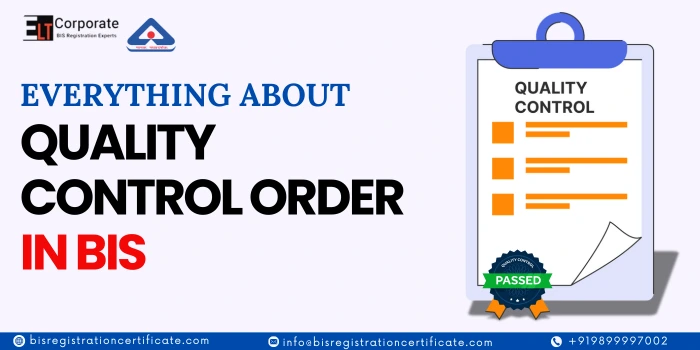What Is QCO In BIS? [Comprehensive Guide]
Are you curious about what QCO stands for and how it relates to quality control in India? If you’re looking to understand all about Quality Control Order (QCO) and its implications under the Bureau of Indian Standards (BIS), you’re in the right place. This article aims to clarify your doubts and guide you through the essentials of QCO in BIS. Whether you’re a business owner, an importer, or just someone interested in quality standards, understanding QCO is crucial.
In this complete guide, we’ve covered all the aspects of Quality Control Order (QCO) in BIS, its compliances, importance, process, and many more. Quality Control Orders are regulations issued by the Bureau of Indian Standards to ensure that products meet specified quality and safety standards. These orders mandate compliance with BIS standards for manufacturing, importing, and selling certain products in India.
Therefore, continue reading until the end to completely understand QCO.
What Is QCO?
Quality Control Order is a regulation introduced by the government of India. It ensures that the products meet specified standards, are safe, and are of good quality. Mainly, it manages all the product’s quality and safety before they can be manufactured, imported, or sold All the manufacturers and importers must obey the norms established by QCOs.
Who Issues QCO?
The QCO are issued by the specific Ministry or Department of the Government of India, which is responsible for the particular goods/product type. This includes the Bureau of Indian Standards (BIS) and other related government bodies.
Who Can Issue QCO Order For Mandatory Certification Of Goods?
Certain departments of the Government of India can issue Quality Control Order for mandatory certification of goods/products. Ensure products are safe, high-quality, and fulfil the standard.
What Is The Penalty For Selling Products Come Under QCO Without BIS Certification?
There are various penalties for selling products that come under QCO without BIS certification, such as imprisonment of up to 2 years, a minimum of 2L of fines, product seizure, and much more. Therefore, our suggestion is not to sell products without BIS certification to avoid such penalties.
What Is The Purpose Of QCO?
Quality Control Orders make sure that consumers have access to safe, reliable, top-quality products available on the market. QCO also manages imports and exports by making sure that they meet the quality standards set by them.
Apart from this, the products covered under QCO must have BIS Certification to import or export the products legally. Without having a BIS Certification, the products cannot be manufactured or sold; if so, strict legal actions will be taken.
What Products Are Covered Under QCOs?
The products covered under QCOs have a wide range range of products listed below:
- Household Electrical Appliances:
- Refrigerators
- Air conditioners
- Washing machines
- Microwaves
- Electric irons
- Toasters
- Food Items:
- Packaged foods
- Beverages
- Dairy products
- Edible oils
- Spices
- Medical Devices:
- Diagnostic equipment
- Surgical instruments
- Medical imaging devices (e.g., MRI, CT scanners)
- Blood pressure monitors
- Glucose meters
- Consumer Goods:
- Toys and children’s products
- Personal care products (e.g., shampoos, soaps, cosmetics)
- Textiles and clothing
- Industrial Products:
- Machinery and equipment
- Construction materials (e.g., cement, steel)
- Industrial chemicals
- Electrical components (e.g., transformers, circuit breakers)
- Electronics:
- Televisions
- Computers and laptops
- Mobile phones
- Audio and video equipment
- Home appliances (e.g., vacuum cleaners, mixers)
Above mentioned are the products which come under the Quality Control Order. To manufacture, sell, or import these products into the market, you must get BIS Certification beforehand to avoid legal action.
How Does QCO Work In BIS?
QCOs are issued by the BIS for specific products that fall under its jurisdiction. The order outlines the quality standards that must be met and the testing protocols required. Once a product complies with these standards, it can bear the BIS certification mark which indicates quality to consumers.
This certification process includes both factory inspections and product testing. Thus, QCO plays a critical role in the overall quality assurance ecosystem.
Also Read: Requirements For BIS Certification
Who Needs To Comply With Quality Control Order?
Manufacturers and importers of certain products need to comply with QCO as per BIS. If you’re a business that falls under these categories, you must ensure that your products meet the established quality standards. Non-compliance can lead to severe penalties, including fines and bans on product sales. Therefore, it is very essential to stay updated on which products require compliance, as the list can evolve based on market needs and consumer safety concerns.
What Happens If Manufacturer Does Not Comply With QCO?
If a manufacturer doesn’t follow QCO, you have to face product recalls, penalties, or even a ban on selling products in the market.
Are Quality Control Orders Applicable To All Types Of Products?
No, QCO does not apply to all the products. It especially focuses on product categories such as food items, medical devices, electrical appliances, and consumer and industrial goods.
What Is QCO In Quality Control?
QCO in quality control is all about protecting consumers by enforcing strict regulations on manufacturing and imports.


